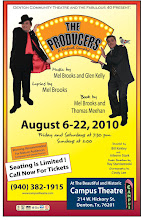 Thanks to Jack Sutter for the photo. Pictured: Jack Sutter (L) and Buster Maloney in the title role of Denton Community Theatre's Cyrano de Bergerac (R)
Thanks to Jack Sutter for the photo. Pictured: Jack Sutter (L) and Buster Maloney in the title role of Denton Community Theatre's Cyrano de Bergerac (R) My husband, the brilliant opera singer I married, said something recently that really stuck in my mind with regards to performing and performers. He's currently rehearsing for Music Theatre of Denton's middle show of it's 2009/2010 season, Pirates of Penzance (which opens this Friday, by the way!). He's playing the role of Frederic, naturally, and when we were talking about how rehearsals were going one night, he said the following:
"It's going really, really well. This is the kind of singing I really should be doing. It just sits right in my wheelhouse."
I must have looked at him a bit funny, because he continued, "It just feels right in my voice. This is the kind of [non-operatic] musical theatre where I really can show what I've got. I don't really have to struggle."
Now, I may be a bit biased when it comes to him, but I tend to think he's been pretty dadgum awesome in other roles (most recently: Billy Flynn in Chicago, Paul in Company, Hysterium in A Funny....Forum, and Cliff in Cabaret to name a few), but I know exactly what he's saying.
Because I'm a total nerd, I looked up the word wheelhouse on Dictionary.com after that day. It was defined as "an enclosed structure on the deck of a ship from which it can be navigated."
Huh.
So what he was telling me was that he is essentially owning this role, and he feels like he is in control, at least vocally. This is where he's most confident, and where he feels that he can make decisions more easily within the role because he's not struggling to make it work within his voice or his range. To keep the ship captain analogy, it means that he knows his surroundings and is comfortable, as opposed to say, putting a deckhand in the wheelhouse of a ship and telling him to steer it. Eventually the deckhand will figure it out – probably because he has to. It would be, quite literally, a "sink or swim" situation.
How often do we feel that confident in a role? If we're lucky, it happens a couple of times. We'll walk into an audition, nail it, and get cast in a role that fits us like a glove. But let's be honest – more often than not (especially in community theatre where the human resources are much more limited) we feel more like the deckhand in that wheelhouse rather than the captain. For one reason or another we won't be cast in the role that we could sing or act the crap out of easily, and we have to work (sometimes really hard) to get it into our muscle memory and perform it to our fullest potential. The results when we do work that hard can be really rewarding, even if the process is exhausting and/or emotional.
Does this mean that it's any less rewarding to play a role that sits right in our wheelhouse? Absolutely not – at least, I don't think so. When a role fits you like a second skin, whether because you can sing it effortlessly or because you can just really identify with the character, it allows for all that much more exploration and delving within the subtext and intricacies of the script and/or score.
It's also a helluva lot of fun to watch an actor perform a role that sits right in his or her own wheelhouse!
Recently, my husband and I went to see our local theatre's production of Cyrano de Bergerac because our good friend Buster (pictured above) was playing the title role. Now, we've both had the pleasure of working with Buster on several different occasions, and the man always nails the roles he is cast in. I've seen him as Pseudolus (alongside my husband's Hysterium) in Forum, performed with him in Company (where he played Harry) and watched him backstage every night as Thurston Wheelis, et al in A Tuna Christmas. Each time, I was impressed by his performance.
To see him as Cyrano, though, was far and away the most impressed by him (and proud to call him friend!) I have ever been. He expertly navigated the poetry of the flowerly language effortlessly and made the character just as heartbreaking and funny as he should have been. He smoothly glided over the waters of a difficult (for modern audiences and mostly untrained actors) script. It was easy to tell that this more classical acting style was where Buster felt the most comfortable. This was what he trained and studied to do. He was right in his wheelhouse, and what fun it was to watch him.
I'm still figuring out what exactly makes up my own wheelhouse. I have a feeling I'll know it when it happens, and I look forward to that moment and the rehearsal process and performances of a role that I can navigate and steer along easily – and I hope that audiences will enjoy watching it as much as I'll enjoy doing it.


















Cool concept, this "wheelhouse" thing! I love the insight you're providing into musical theatre from someone who's always enjoyed it from the outside (or, a couple of times, the orchestra pit).
ReplyDeleteThanks, Courtney! I don't post here all that often because I rarely feel like I really have something appropriate and of value to say...so I appreciate that anyone even reads it. :)
ReplyDelete"Wheelhouse" is also, as you may be aware, a term used in baseball. To say that a pitch was "right in someone's wheelhouse" is to say that it was the sort of pitch he loves to take a full cut at and usually knocks out of the park.
ReplyDelete